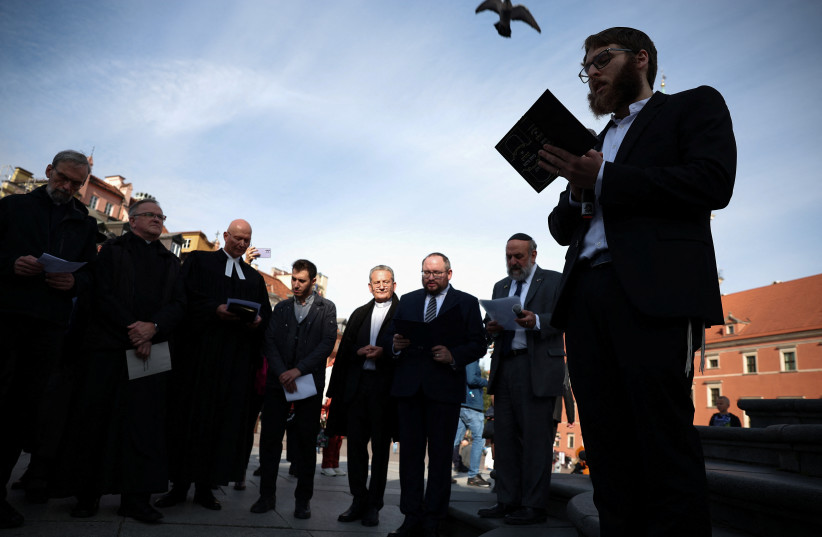Faith and hope are much-needed commodities as Israel fights bestial Hamas terrorists in Gaza. A new study from Brigham Young University (BYU) – the Mormon academic institution in Utah – has found that a family’s religious beliefs and practices are a key catalyst to promote hope in the future to manage personal challenges that can help families build resiliency and unity.
To understand the relationship between religious beliefs and hope within family relations, the researchers – who published their findings in the journal Family Relations under the title “We have hope: An exploration of hope in highly religious families,” carefully analyzed in-depth interviews with nearly 189 Christian, Jewish and Muslim religious families and their demographic features.
Participants were asked a series of questions about their family processes and religion in family life. While none of the questions questioned them directly about hope, the responses offered by many families centered around hope and led researchers to categorize the respondents’ references to hope.
The findings underscored the key role that religious beliefs and practices play in nurturing hope within a family. Participants frequently cited their faith as a wellspring of hope, drawing strength from their belief in God’s active involvement in their lives and their conviction in an afterlife. Engaging in religious practices such as reading the Bible and attending worship services further solidified their sense of hope, regardless of religious denomination.
“One of the main things I take away from this study is how much commonality there is across faiths,” said family life Prof. David Dollahite and a co-author. “The overarching message from our research is that faith and religion and belief, when taken seriously, produce profound similarities, including increased hope for the future and hope in God’s plan for their family. Highly religious people across faiths have a lot in common.”

'Faith and family are a powerful antidote to loneliness.'
Notably, in 39% of the hope-related discussions, hope was characterized as a familial trait and value – a collective “our hope.” Parents expressed a strong desire to instill hope in their children, recognizing the positive impact it had on their ability to navigate life’s challenges, and hope was found to strengthen marital bonds and mitigate conflicts.
“We’re finding that virtues instilled as part of a religious family are very relational,” noted Dollahite. “While there have been news stories about the epidemic of loneliness in society, our research shows the power that faith and religion have in strengthening relationships. Faith and family are a powerful antidote to loneliness. Faith and family can bring hope and can be a remedy to some of the main issues we see in society.”
Deepening our understanding of hope has positive benefits for individuals and societies, said former BYU doctoral student Joe Chelladurai who is now a senior researcher at the Church’s Correlation Research Division and co-authored the paper.
“There is passive and active hope. Active hope is something that can be developed,” said Chelladurai. “I feel that developing hope during times of normalcy can help prepare someone when they face difficult challenges. According to American psychologist Charles Richard Snyder who specialized in positive clinical, social, personality and the pioneer of hope theory, hope involves goals; the ability to creatively find more than one way towards a goal; and willpower, or the motivation to try. One way to develop hope is by strengthening each of these aspects when things get hard and cognitive load and psychological tunnel vision set in.”
Researchers identified four main themes in the ways families expressed how religious beliefs inspired their hope.
- Faith and religious belief prompt hope; many participants noted that their faith both provided and helped sustain their hope. “When something happened in my family, faith let us know that we have the same hope. When I had challenges of career or health, I realized that all of our life is in God’s hand. This gives me a lot of comfort and also gives me promise,” noted one interviewee.
- Religious practices inspire hope. Many interviewees noted that participating in regular religious practices, such as reading religious texts, praying and attending worship services, was important in providing hope. “There’s always hope. no matter what happens in our lives. We believe in what God says in His Word, and so there’s always something that will make it good,” noted a Christian participant.
- Hope can be a familial trait. While many researchers study hope as an individual trait, Dollahite and his colleagues found that 39% of the data they analyzed identified hope as a trait the family collectively held. Participants frequently described hope in words such as “our hope” or by saying, “We have hope.” “We try hard to make our kids know that they’re loved and that there’s hope and there’s always someone there that loves them and cares for them,” said one participant.
- Hope builds resilience. The research found that the primary ways that the participants experienced religious hope was through a hope for the future and a hope to overcome challenges, not only individually, but as a family unit. “We are not without hope. We are not hopeless. We have prayer. Those are anchors that we have that others may not have. Although it may look bleak right now, there’s always hope because of the hope that you have in [God[, said another participant.
They concluded that for some families, religious beliefs and specific religious practices play an important role in fostering hope, and this hope was reported to enhance various elements of individual and family life.
